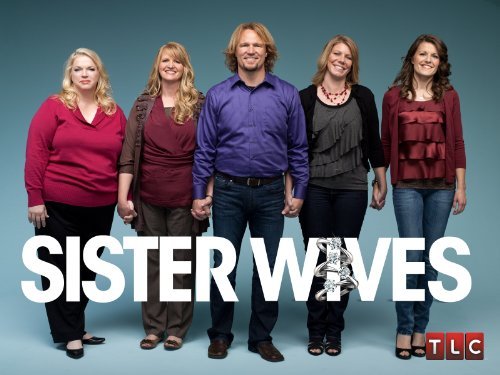Sister Wives polygamy lawsuit ruling overturned, could be headed to Supreme Court
Sisters Wives star Kody Brown and his family won a huge victory for polygamy in December of 2013 when U.S. District Court judge Clarke Waddoups ruled in the family’s favor in their lawsuit against the state of Utah, all but legalizing polygamy in the state. Earlier this week, the Brown family’s legal roller coaster ride continued as a Federal Appeals Court overturned Waddoups’ decision — not based on the constitutionality of Utah’s anti-polygamy laws or the lack of merit in the Browns’ case, but based on the fact the state promised to leave the Browns (and some — but not all — other consenting adults practicing cohabitation) alone.
The three-person Federal Appeals Court panel consisted of circuit judges Scott Matheson, Jr., Bobby Baldock, and Nancy Moritz. In the opinion issued by the panel, it recognized that cohabitation by consenting adults is legally considered bigamy according to Utah statute, which is a third-degree felony. But, because the Utah County Attorney’s Office promised not to pursue the Brown family any more and enacted a policy of prosecuting bigamy only against those who were suspected of other crimes, the panel determined that the Brown family’s case should never have been heard by the court.
From the opinion:
The Utah County Attorney’s Office (“UCAO”) subsequently closed its file on the Browns and adopted a policy (“the UCAO Policy”) under which the Utah County Attorney will bring bigamy prosecutions only against those who (1) induce a partner to marry through misrepresentation or (2) are suspected of committing a collateral crime such as fraud or abuse. The Browns fall into neither category. Nonetheless, the district court denied the Utah County Attorney’s motion to dismiss the case as moot and instead granted summary judgment to the Browns.
The district court erred by proceeding to the merits.
I confess that I am no legal expert, but it seems absurd to me that the court was willing to accept that the Brown family did face persecution from the state of Utah because of its bigamy law, but because prosecutors later promised (late in the initial court proceedings by the way) to stop hassling the Browns, they no longer have the legal right to challenge the law? A law that is still in place, but is now arbitrarily enforced? What is the Latin term for WTF?!
Of course, the Brown family’s lead counsel, attorney Jonathan Turley, feels similarly. From his statement after the ruling:
The panel ruled entirely on standing grounds and did not address the merits of the constitutional violations committed in the case. As lead counsel in the case, I have been going over the opinion with our team including our local counsel, Adam Alba, as well as the Brown family. We respectfully disagree with the panel on its interpretation of the governing law and we will appeal the decision.
Turley explains at length that the appeal filed by prosecutor Jeffrey R. Buhman did not challenge the merits of the case or whether or not it was moot. The appeal also did not challenge the fact that the Browns were, indeed, persecuted by Buhman and his office:
Notably, in his appeal, Buhman did not challenge the facts or holdings in the prior standing and mootness decisions. Buhman did not contest that the appellate panel should reach the merits of the decision below and did not claim that the case was moot. He also did not challenge the factual findings below. He did not challenge prosecutors targeted the Brown family after their public discussions of their cohabitation, including television interviews and university presentations. Defense counsel admitted to “endless” condemnations by the Attorney General of polygamists and express public condemnations of plural family members as “criminals.” Buhman admitted that the law is a “means” to make it easier to investigate and perform searches or seizures on plural families (while other families do not face the same risk). It was also uncontested that the Brown family “fled from Utah to Nevada for fear that they would be criminally prosecuted for practicing bigamy.” The lower court found that past prosecutions discredited assertions that no “credible threat of prosecution exists.” Judge Waddoups also found that “Utah County expressly declined to disavow that Plaintiffs may be prosecuted for bigamy” during most of the pendency of the trial proceedings. The court found that Buhman’s belated issuance of a new “policy” only was made after losing key motions in court and facing a final decision. The trial court refused to yield to such a tactical move and questioned both the existence of a real policy and the guarantee that the Browns would not be prosecuted.
Just in case I did a terrible job of explaining what happened, here is a better synopsis written by a commenter on Turley’s blog under the name “Dr. George:”
The Tenth Circuit decided the the lower court should never have taken the case because the Browns lacked standing to sue since the prosecutor had not indicted them and the likelihood of prosecution was too remote to give them standing. The Tenth Circuit appeared to ignore the “chilling effect” of the statute. It vacated the lower court decision, restoring the status quo prior to the lawsuit. Judge Waddoup’s original decision has no precedential value in law, but his logic was legally correct: under the First Amendment, individuals have a right to cohabit as they wish if they do not infringe upon the rights of others. That principle is well established in law and has application far beyond the consensual practice of polygamy, and the consensual practice of plural marriage has application far beyond the borders of Utah. If the Browns appeal and if they can convince the US Supreme Court that they have standing since the law is likely to be applied to them, it is likely, given the logic of Obergefell v Hodges (the gay marriage case), that the Utah statute will be found unconstitutional. Even non-polygamists ought to applaud the principle that the State has no business criminalizing consensual cohabitations, in any form. The 10th Circuit decision is not going to make the legal issue go away.
As Dr. George states, the Browns’ appeal could mean their case is headed to The US Supreme Court — something Turley and his clients are still deciding. “We have the option of seeking the review of the entire Tenth Circuit or filing directly with the Supreme Court,” Turley says. “We also have the ability to seek a rehearing from the panel. We will be exploring those options in the coming days,” he adds.
“However, it is our intention to appeal the decision of the panel,” Turley continues. “While we respect the panel and its lengthy analysis, we believe that the opinion rests on a flawed understanding of both the facts and governing law in this case, including controlling Supreme Court cases.”
Turley also shared comments on behalf of the Browns. “The Brown family is obviously disappointed in the ruling but remains committed to this fight for the protections of religion, speech, and privacy in Utah,” says Turley. “This has been a long struggle for the Brown family but they have never wavered in their commitment to defending the important principles of religious freedom in this case. The decision today only deepens their resolve to fight for those same rights. It will be an honor to continue this fight with the Brown family in seeking the recognition of equal religious and speech rights for all families in Utah.”
The Browns retweeted Turley, but so far they haven’t addressed the ruling directly on social media.
Taking a silver linings approach on behalf of the Browns and other US polygamists, if the Supreme Court overturns the Tenth Circuit Court ruling, it would all but legalize polygamy (without multiple legal marriages) nationally!







